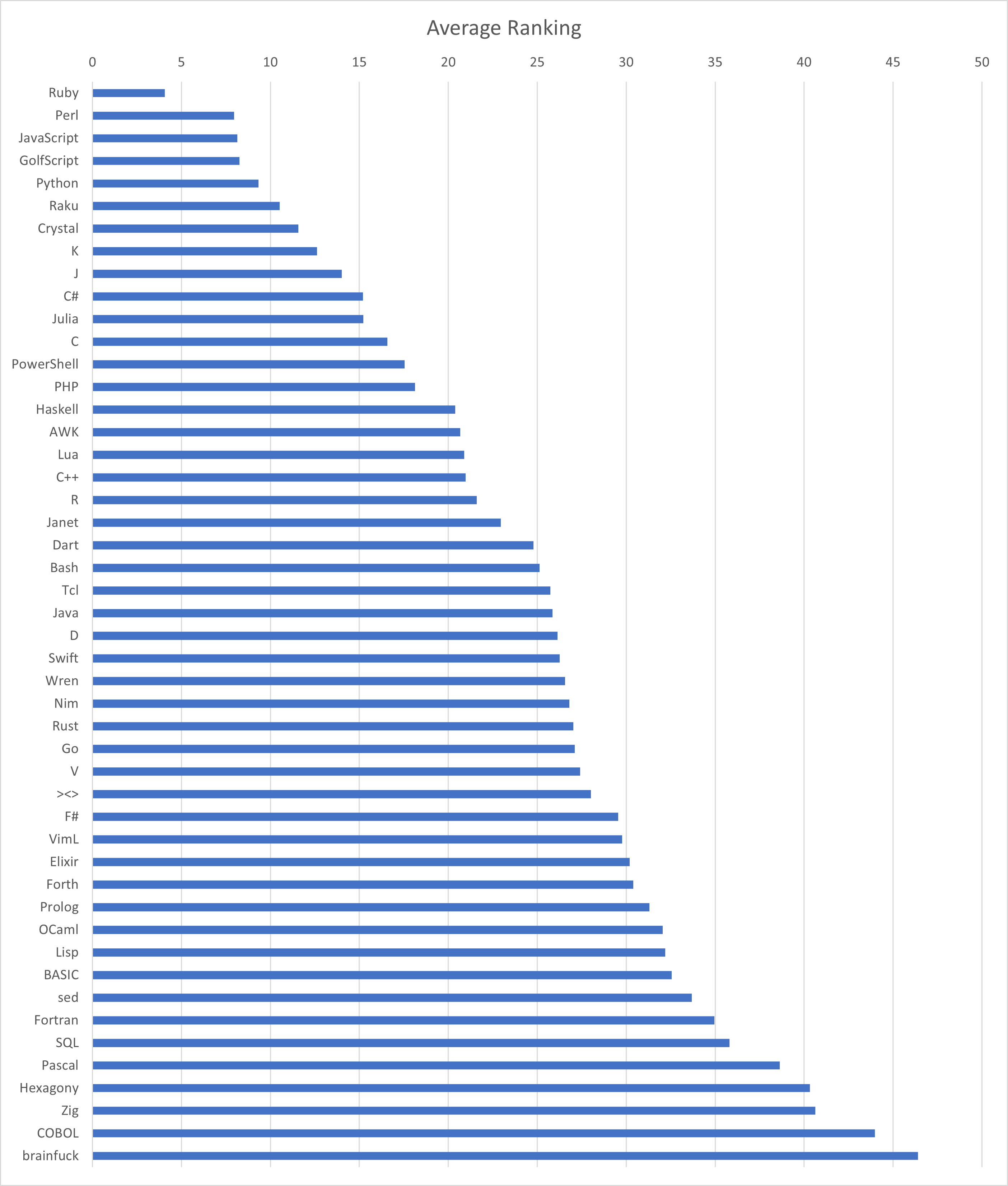I was looking at code.golf the other day and I wondered which languages were the least verbose, so I did a little data gathering.
I looked at 48 different languages that had completed 79 different code challenges on code.golf. I then gathered the results for each language and challenge. If a “golfer” had more than 1 submission to a challenge, I grabbed the most recent one. I then dropped the top 5% and bottom 5% to hopefully mitigate most outliers. Then came up with an average for each language, for each challenge. I then averaged the results across each language and that is what you see here.
For another perspective, I ranked each challenge then got the average ranking across all challenges. Below is the results of that.

Disclaimer: This is in no way scientific. It’s just for fun. If you know of a better way to sort these results please let me know.


Java placed way better than I expected
You can write concise Java. Just like you can write readable Haskell. It’s just not idiomatic to do so.
System.out.print("I agree.");Don’t you mean:
class AgreementManagerClass { public static void main(String[] args) { System.out.println("I agree."); } }It is always dismissed as too verbose, while in go’s case it is never mentioned, when in fact the latter is way more verbose… People’s bias show.
Maybe also bias by the number / experience of people using it.
1st semester students getting shocked by
public static void main(String args)and meming it on the internet.Go on the other hand likely isn’t a common choice / option for a first language.
I will gladly complain any day about go being terribly verbose.
Go’s less verbose than Java in my experience. And I’ve written quite a lot of both. But YMMV.
My mileage has indeed varied.
Code Golf rules allow people to submit an anonymous function instead of a full program, which eliminates a lot of the boilerplate.
They weren’t writing enterprise Java or they’d need a dozen factories and a few factory factories and probably a factory factory factory just to be safe.
Ya but then you’ll need a factory for all of those factories
You’re confused, I get it. You only need one factory factory as long as you sprinkle Inversion of Craziness (IoC) all over everything. Also, for this to work you must spread your code into as many files/directories as possible and also make sure you use really, really strict and verbose XML that doesn’t just define how your code runs but instead generates code itself.
I highly suspect the reason why Java didn’t seem to have as much code is because the authors were using proper enterprise Java which is mostly XML that can only be understood if your IDE takes at least 5 minutes to open and another 5 to open your project.
I don’t know the specifics of the golf problems, but I’m mostly in c#, also notorious for “having too much boilerplate,” and it looks like it’s 3rd by char count.
My guess is that languages with comprehensive standard libraries can do more with less custom code. As you should expect.
And yet C with its not at all comprehensive standard library did well. I’m a bit puzzled about these results.
There’s no way that Go is more verbose than Java. I’ve written both in decent quantities and Java was always way more verbose than Go for me. I suspect it’s the nature of code.golf giving these results more than the languages themselves.
I wonder if it’s all those variables named with single letter and abbreviations, so annoying to code review
String IDontKnowWhatsWorseEspeciallyWhenTheTypeIsAlsoIncludedString = “I don’t know what’s worse, especially when the type is also included”;
Honestly, I prefer an overly long name over some cryptic naming scheme that looks like minified JS. At least you can be sure of the variable’s purpose and don’t have to guess, which is far better for readability.
Yes, but it looks like it is already I think more than twice as verbose as Python.